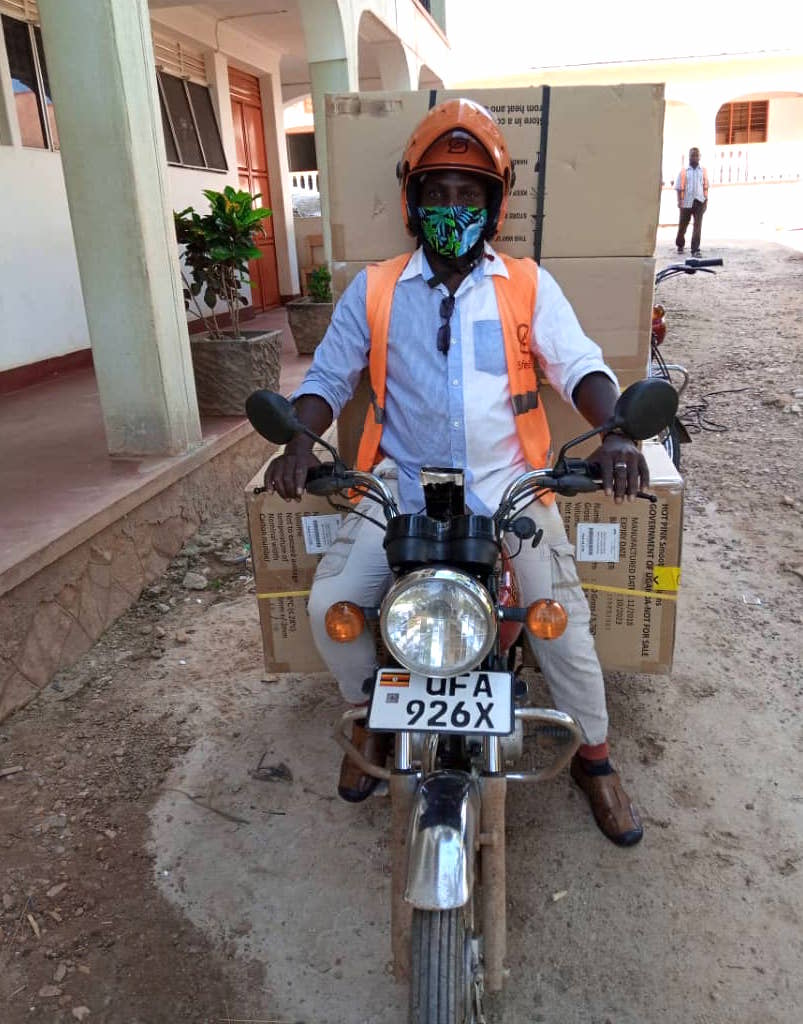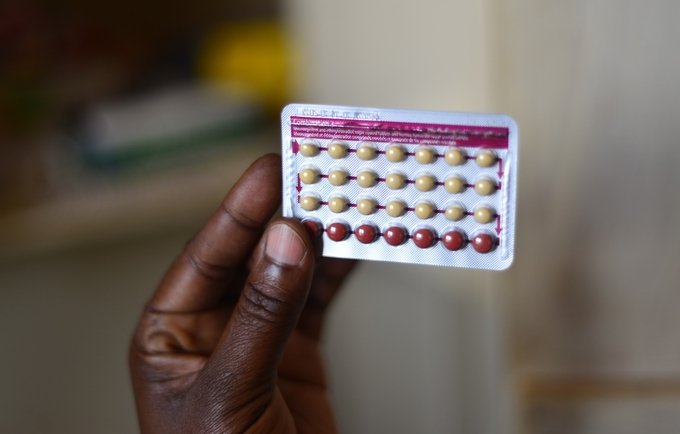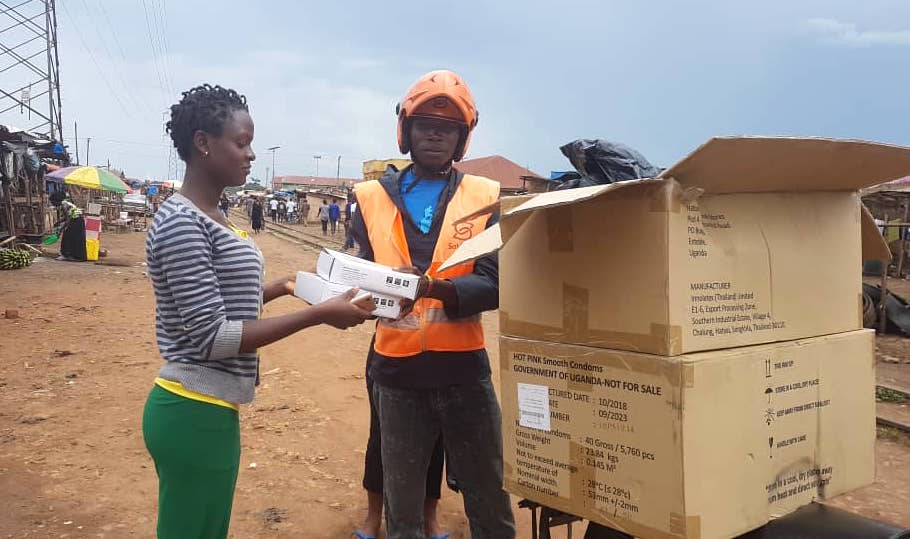KAMPALA, Uganda—“I walk through the trading centre on my way home and as I go, I sing a song in Luganda (a local language) ‘SafeBoda SafeBoda, who needs a helmet?’ Or ‘For those who feel cold I have a coat for you*’,” said Betty Nagadya. A Village Health Team volunteer who picks up condoms delivered to a nearby health centre by SafeBoda drivers, she distributes them in her community, as part of COVID-19 response efforts supported by UNFPA.
“There are usually [ … ] young people, mostly young men. Many of them are still shy to talk about using condoms but when I sing my song they understand what I mean, so they come and ask questions. I teach them how to use condoms and give them to them. I also go to houses where I know there are people who might need condoms,” she said.
I teach them how to use condoms and give them to them. I also go to houses where I know there are people who might need condoms.

Betty is a Village Health Team member attached to Sentema Health Centre II. These community volunteers provide accurate health information, mobilize communities and link people up with health services.
Under Uganda’s COVID-19 lockdown, currently at level 3, contraceptives and other services such as HIV test kits, pregnancy test kits and Mama Kits (a standard kit for clean, safe delivery) have been in short supply – but now these items can be ordered using an innovative mobile app that secures delivery to the buyer’s doorstep.
An e-shop enables users to order and take delivery of reproductive health commodities at their doorstep in Kampala and Wakiso districts. Using the “Personal Health Shop” on the SafeBoda app, customers can order condoms, contraceptives pills, HIV test kits, pregnancy test kits and Mama Kits conveniently and privately. This service was launched by UNFPA, the United Nations sexual and reproductive health agency, and the ride-hailing company SafeBoda.
I’m excited that SafeBoda can deliver my reproductive health commodities, especially things we fear to order over the counter.

“I’m excited that, other than delivering other commodities, SafeBoda can also deliver my reproductive health commodities, especially things we fear to order over the counter, such as postinor (emergency oral contraceptive) and condoms. I am sure most people are excited about this. Kudos to these guys,” said Flora Peace from Nansana.
COVID-19 adds barrier to accessing health services
In Uganda, the fertility rate is 4.7 children per woman. The modern contraceptive prevalence rate is 31 per cent, while unmet need among women aged 15 to 49 stands at 19 per cent.
The pandemic is compounding the barriers that women and young people face in accessing sexual and reproductive health services. Supply chains have been interrupted, resulting in delays in ensuring that essential health commodities such as contraceptives are available at health facilities and community distribution points.
The e-shop initiative, supported by the Embassy of Sweden in Uganda, is one of the ways that UNFPA is stepping up to address such challenges.
SafeBoda driver Moses Okanya, 25, has been delivering boxes of condoms to St Francis Hospital in Kakiri. He wears a mask and uses hand sanitizer.
Making the condoms available to [young people] is something I am proud of, because any delay to provide the condoms will put an impact on somebody’s life.

“I feel I have played a role to reach my fellow young people because if the condoms are not in the hospital, then the young people are going to put themselves at risk. Making the condoms available to them is something I am proud of, because any delay to provide the condoms will put an impact on somebody’s life. Somebody could go in for [unprotected] sex and they could get sexually transmitted infections. We may put more emphasis on COVID-19, and then we are losing people from other diseases which have been there before,” he said.
Ensuring access to sexual and reproductive health
Ensuring that people have access to a package of integrated sexual and reproductive health services is critical, including during the current pandemic, said Alain Sibenaler, UNFPA Representative for Uganda.
Through the Personal Health shop initiative, we are able to deliver reproductive health commodities right to people's doorsteps at the click of a button.
"We have had to rethink and become more innovative in reaching young people and women with sexual and reproductive health-related information and services," he said. "Our partnership with SafeBoda has expanded the possibilities of using digital solutions to solve real-time problems. Through the Personal Health shop initiative, we are able to deliver reproductive health commodities right to people's doorsteps at the click of a button."
Partnership to empower communities
To order via the SafeBoda app, the user downloads it onto their smartphone, then selects items and pays with mobile money using SafeBoda credit, or cash on delivery. The closest listed pharmacy within a seven kilometre radius that has the item in stock is identified and linked to the nearest SafeBoda driver. The driver then picks up the item and delivers it to the user.
Sexual and reproductive health has a long-term impact on overall health and development at a personal and macro level.
"Sexual and reproductive health has a long-term impact on overall health and development at a personal and macro level. Our partnership with UNFPA gives us an opportunity to empower communities by making sexual and reproductive health knowledge and products accessible to people across socio-economic groups," said Ricky Rapa Thompson, co-founder of SafeBoda.
All reproductive health items ordered through the Personal Health shop are delivered free of charge. Free condoms provided by the government can also be ordered through the app. The service will continue post COVID-19, for a nominal delivery fee.
* Helmets and coats are a euphemism for condoms.


